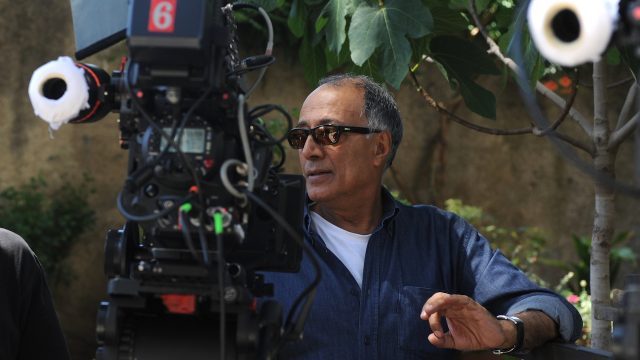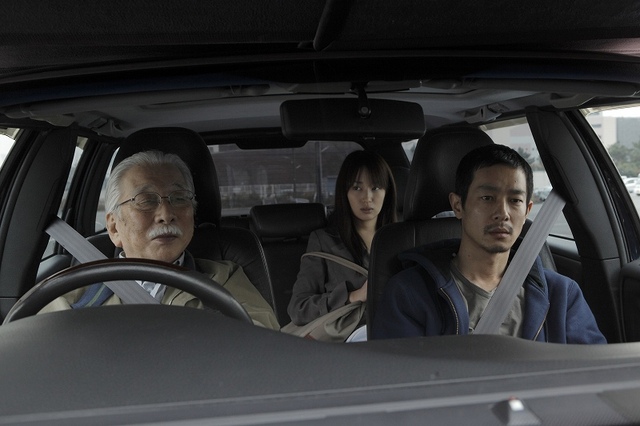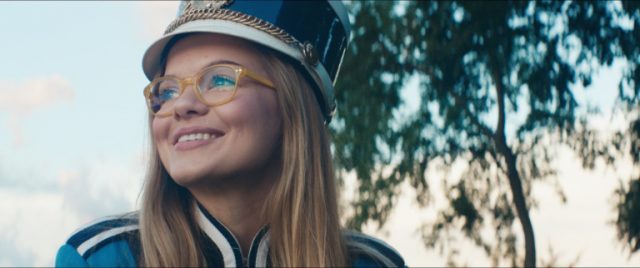
Carolyn Harper (Raven Whitley) goes missing in teen noir Knives and Skin
KNIVES AND SKIN (Jennifer Reeder, 2019)
Nitehawk Cinema Williamsburg
136 Metropolitan Ave. between Berry St. & Wythe Ave.
Tuesday, September 17, 7:00
Festival runs September 14-17
718-384-3980
nitehawkcinema.com
www.chicagofilmproject.com
 Knives and Skin, Jennifer Reeder’s feature-length debut as a writer-director, is the closing-night selection of Eyeslicer Fest, four days of special events celebrating the second season of The Eyeslicer, the self-described “secret TV show blending the boldest new American filmmaking into mind-expanding, mixtape-style episodes.” Screening September 17 at 7:00 at Nitehawk Cinema in Williamsburg, Knives and Skin is a creepy coming-of-age tale of girlhood, loss, and consent set in small-town America where the disappearance of a teenage girl tilts an already off-balance community even more on edge. Marching band member Carolyn Harper (Raven Whitley) has decided to lose her virginity to jock Andy Kitzmiller (Ty Olwin), but when she suddenly changes her mind, he becomes angry, pushes her to the ground, and leaves her in the woods. When she doesn’t come home, her mother, Lisa (Marika Engelhardt), quickly goes off the deep end, obsessed with her daughter’s clothes and smell. Fellow marching band members Charlotte Kurtich (Ireon Roach), April Martinez (Aurora Real de Asua), and Afra Siddiqui (Haley Bolithon), each of whose identities lie firmly outside old-fashioned mainstream America’s idea of girlhood, are preparing for homecoming, but Carolyn’s situation has cast a damper over everything.
Knives and Skin, Jennifer Reeder’s feature-length debut as a writer-director, is the closing-night selection of Eyeslicer Fest, four days of special events celebrating the second season of The Eyeslicer, the self-described “secret TV show blending the boldest new American filmmaking into mind-expanding, mixtape-style episodes.” Screening September 17 at 7:00 at Nitehawk Cinema in Williamsburg, Knives and Skin is a creepy coming-of-age tale of girlhood, loss, and consent set in small-town America where the disappearance of a teenage girl tilts an already off-balance community even more on edge. Marching band member Carolyn Harper (Raven Whitley) has decided to lose her virginity to jock Andy Kitzmiller (Ty Olwin), but when she suddenly changes her mind, he becomes angry, pushes her to the ground, and leaves her in the woods. When she doesn’t come home, her mother, Lisa (Marika Engelhardt), quickly goes off the deep end, obsessed with her daughter’s clothes and smell. Fellow marching band members Charlotte Kurtich (Ireon Roach), April Martinez (Aurora Real de Asua), and Afra Siddiqui (Haley Bolithon), each of whose identities lie firmly outside old-fashioned mainstream America’s idea of girlhood, are preparing for homecoming, but Carolyn’s situation has cast a damper over everything.
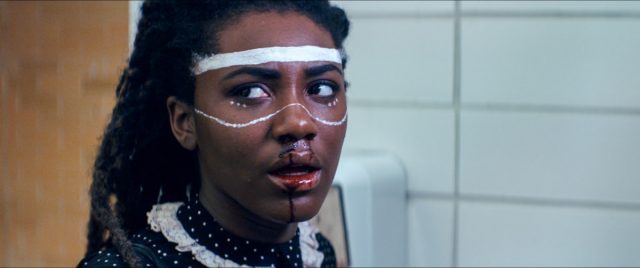
Charlotte Kurtich (Ireon Roach) faces a harsh reality in Jennifer Reeder’s Knives and Skin
Reeder focuses on two families over the course of the film, which was inspired by the work of such feminist auteurs as Chantal Akerman and Catherine Breillat in addition to such indie faves as Todd Solondz and Todd Haynes, with the heaviest debt to David Lynch’s Twin Peaks as she uses our generic societal anxiety about female teen sexuality to reveal the hidden underbelly of a typical midwestern town, complete with surreal moments. (There’s also bits of Fast Times at Ridgemont High, Mean Girls, and The Breakfast Club embedded in its DNA.) Andy’s mother, Lynn (Audrey Francis), can’t face reality; his father, Dan (Tim Hopper), is an out-of-work clown fooling around with pregnant waitress Renee Darlington (Kate Arrington); his sister, Joanna (Grace Smith), sells underwear to the principal (Tony Fitzpatrick); and he is closest to his unusual grandmother (Marilyn Dodds Frank). Renee is married to Doug (James Vincent Meredith), the local sheriff in charge of the Carolyn Harper case; their son, Jesse Darlington (Robert T. Cunningham), is the school mascot and friends with Joanna; and their daughter, Laurel Darlington (Kayla Carter), is exploring her sexuality with Colleen (Emma Ladji). Racism, misogyny, sexual harassment, bullying, and more lie at the center of a community unable to come to grips with what’s really going on every day.

Cinematographer Christopher Rejano bathes the film in richly saturated blues, reds, greens, and pinks, accompanied by a lurking score by Nick Zinner of the Yeah Yeah Yeahs. There are several scenes that feature hauntingly beautiful a cappella versions of such 1980s hits as Modern English’s “I Melt with You,” New Order’s “Blue Monday,” the Go-Go’s “Our Lips Are Sealed,” Naked Eyes’ “Promises, Promises,” and Icicle Works’ “Birds Fly (Whisper to a Scream),” lending the film a stark poignancy that overrides some of the inconsistent acting and over-the-top absurdities and singlehandedly makes it worth watching. The screening will be followed by a casual party in the Lo-Res Bar; Eyeslicer Fest begins September 14 and also includes the Radical Film Fair at Kickstarter HQ on September 15, the world premiere of season two of The Eyeslicer in Green-Wood Cemetery on September 16, and the theatrical release of Aaron Schimberg’s Chained for Life at IFC through September 19.
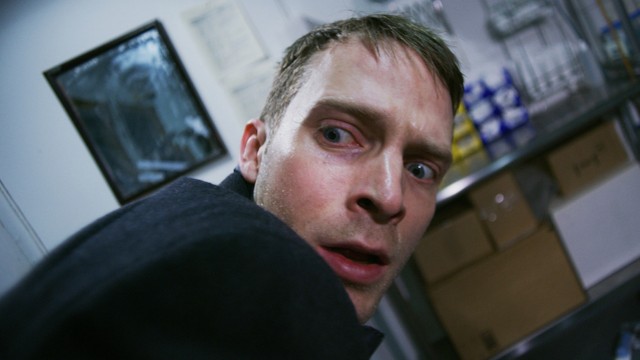
 Earlier this year, Larry Fessenden’s Depraved made its world premiere at IFC Center as the opening-night selection of What the Fest!?, five days of twisted films and discussions that pushed the boundaries of the horror genre. Depraved, which does just that, is now back at IFC for its inaugural theatrical release. “Humanity does so love destruction. Depraved. That’s what we are. Utterly depraved,” Polidori (Joshua Leonard) explains in the film, a contemporary reimagining of Frankenstein and The Bride of Frankenstein involving the military, Big Pharma, and fatherhood. The smooth-talking Polidori (named for John William Polidori, an acquaintance of Mary Wollstonecraft’s who in 1819 published the first modern vampire story) is overseeing a cutting-edge experiment by Henry (David Call), who is seeking to bring life to the dead through surgery, medication, and therapy. (Dr. Frankenstein was named “Victor” in Mary Shelley’s book but “Henry” in James Whale’s 1931 movie.) Using body parts from multiple corpses, Henry, a former army medic in Iraq, has patched together a living being he names Adam (Alex Breaux). The final, key piece is the warm brain of Alex (Owen Campbell), who is brutally murdered moments after having a fight with his girlfriend, Lucy (Chloë Levine), in Brooklyn. Adam develops sooner than expected, taking a liking to Henry’s girlfriend, Liz (Ana Kayne), while Polidori uses this as an opportunity to speed up the deals he’s working on. It doesn’t go very well.
Earlier this year, Larry Fessenden’s Depraved made its world premiere at IFC Center as the opening-night selection of What the Fest!?, five days of twisted films and discussions that pushed the boundaries of the horror genre. Depraved, which does just that, is now back at IFC for its inaugural theatrical release. “Humanity does so love destruction. Depraved. That’s what we are. Utterly depraved,” Polidori (Joshua Leonard) explains in the film, a contemporary reimagining of Frankenstein and The Bride of Frankenstein involving the military, Big Pharma, and fatherhood. The smooth-talking Polidori (named for John William Polidori, an acquaintance of Mary Wollstonecraft’s who in 1819 published the first modern vampire story) is overseeing a cutting-edge experiment by Henry (David Call), who is seeking to bring life to the dead through surgery, medication, and therapy. (Dr. Frankenstein was named “Victor” in Mary Shelley’s book but “Henry” in James Whale’s 1931 movie.) Using body parts from multiple corpses, Henry, a former army medic in Iraq, has patched together a living being he names Adam (Alex Breaux). The final, key piece is the warm brain of Alex (Owen Campbell), who is brutally murdered moments after having a fight with his girlfriend, Lucy (Chloë Levine), in Brooklyn. Adam develops sooner than expected, taking a liking to Henry’s girlfriend, Liz (Ana Kayne), while Polidori uses this as an opportunity to speed up the deals he’s working on. It doesn’t go very well.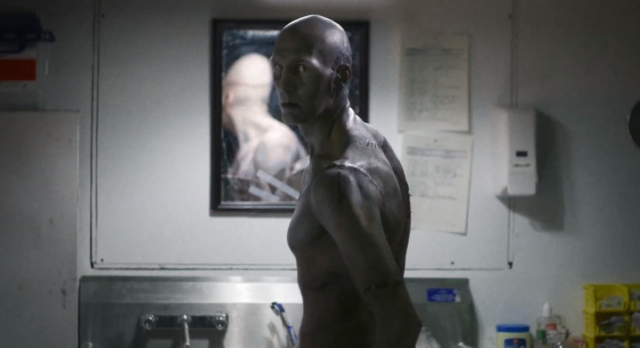
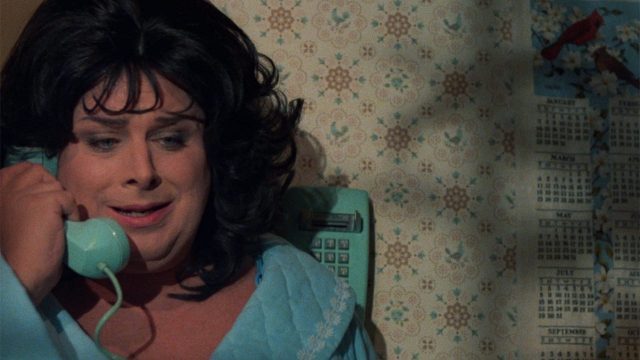
 Camp champ John Waters will be at IFC Center on September 5 for a Q&A and extended introduction at two screenings of a new 4K restoration of his cult classic suburban satire Polyester, joined by costar Ken King, who plays Baltimore Foot Stomper Dexter Fishpaw. The crudely rambunctious film follows the misadventures of the Job-like Francine Fishpaw, ravishingly portrayed by drag queen extraordinaire Divine. Her God-fearing life takes a bitter turn when she catches her nasty, demanding husband, porn purveyor Elmer (David Samson), with his sexpot secretary, Sandra Sullivan (Mink Stole). Her status in the community, so precious to her, is ruined as she becomes an alcoholic, unable to rein in her wildly promiscuous daughter, Lu-Lu (Mary Garlington) — who has the hots for bad boy Bo-Bo Belsinger, played by Dead Boys frontman Stiv Bators!! — or her inhalant-abusing foot-fetishist son. She also receives no emotional or financial support from her skunk of a mother, La Rue (Joni Ruth White). The only one who stands by her is her ultra-strange, simple-minded bestie, the Baby Jane-like although kindhearted Cuddles Kovinsky (Edith Massey), but she finds a glimmer of hope in a handsome hunk of a he-man (Hollywood heartthrob Tab Hunter!!) who tantalizingly keeps showing up on her radar in a flashy white sports car, like Suzanne Somers does to Richard Dreyfuss in American Graffiti.
Camp champ John Waters will be at IFC Center on September 5 for a Q&A and extended introduction at two screenings of a new 4K restoration of his cult classic suburban satire Polyester, joined by costar Ken King, who plays Baltimore Foot Stomper Dexter Fishpaw. The crudely rambunctious film follows the misadventures of the Job-like Francine Fishpaw, ravishingly portrayed by drag queen extraordinaire Divine. Her God-fearing life takes a bitter turn when she catches her nasty, demanding husband, porn purveyor Elmer (David Samson), with his sexpot secretary, Sandra Sullivan (Mink Stole). Her status in the community, so precious to her, is ruined as she becomes an alcoholic, unable to rein in her wildly promiscuous daughter, Lu-Lu (Mary Garlington) — who has the hots for bad boy Bo-Bo Belsinger, played by Dead Boys frontman Stiv Bators!! — or her inhalant-abusing foot-fetishist son. She also receives no emotional or financial support from her skunk of a mother, La Rue (Joni Ruth White). The only one who stands by her is her ultra-strange, simple-minded bestie, the Baby Jane-like although kindhearted Cuddles Kovinsky (Edith Massey), but she finds a glimmer of hope in a handsome hunk of a he-man (Hollywood heartthrob Tab Hunter!!) who tantalizingly keeps showing up on her radar in a flashy white sports car, like Suzanne Somers does to Richard Dreyfuss in American Graffiti.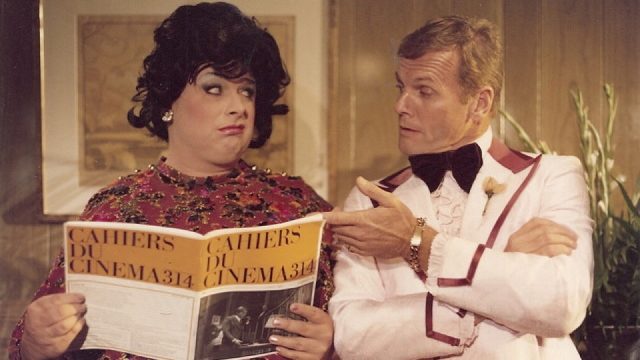
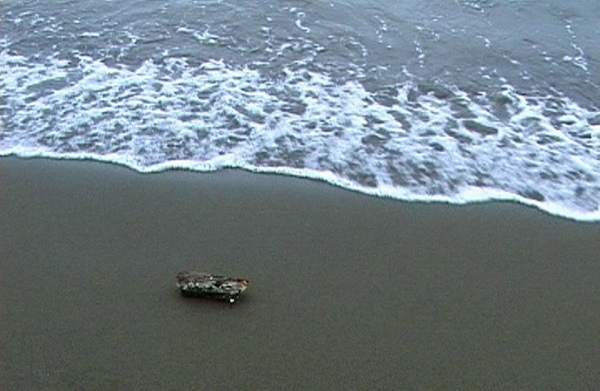
 We first saw Abbas Kiarostami’s gorgeous five-part film Five Dedicated to Ozu at the Iranian director’s 2007 multidimensional MoMA exhibit, “Image Maker,” where all five segments ran continuously and simultaneously in five semiprivate partitioned spaces, each with its own comfy bench. The film as a whole, which is composed of static shots on a beach in Galicia, are dedicated to Japanese director Yasujirō Ozu, whose films attempted to catch the reality of human existence in all its simplicity. In the first episode, the coming waves threaten a piece of driftwood; we dare you not to create your own narrative in your head once the wood is split apart. (By the way, this is the only part of the film that includes any camera movement at all, as Kiarostami opts to follow the driftwood for one short moment.) For the second scene, the camera is moved to the boardwalk, with people passing to the right and left as the surf continues to crash onto the shore; this is the least compelling of the five pieces. Back on the beach for the third part, the camera finds a group of stray dogs in the distance, nestled together by the water; again, as one dog gets up and moves away, left to himself, you’ll create your own ideas about what is really happening. Next is the funniest section of the movie, as a long line of ducks don’t know whether they’re coming or going, but they do so determinedly. Finally, the last scene takes place at night, as the moon glistens in a dark sky as the sounds of frogs and nature envelop this small part of the earth. Relax and let your mind wander during this fascinating and fun cinematic experience that we found exhilarating as a single work — but we also loved how it was installed at MoMA, where you could sit down with any of the films at any time and just let them take you away. Five Dedicated to Ozu is screening the conventional way on August 10 and 14 in IFC’s comprehensive series “Abbas Kiarostami: A Retrospective,” which continues through August 15 with such other films by the Iranian director as The Traveler, Close-Up, Like Someone in Love, 24 Frames, and numerous shorts.
We first saw Abbas Kiarostami’s gorgeous five-part film Five Dedicated to Ozu at the Iranian director’s 2007 multidimensional MoMA exhibit, “Image Maker,” where all five segments ran continuously and simultaneously in five semiprivate partitioned spaces, each with its own comfy bench. The film as a whole, which is composed of static shots on a beach in Galicia, are dedicated to Japanese director Yasujirō Ozu, whose films attempted to catch the reality of human existence in all its simplicity. In the first episode, the coming waves threaten a piece of driftwood; we dare you not to create your own narrative in your head once the wood is split apart. (By the way, this is the only part of the film that includes any camera movement at all, as Kiarostami opts to follow the driftwood for one short moment.) For the second scene, the camera is moved to the boardwalk, with people passing to the right and left as the surf continues to crash onto the shore; this is the least compelling of the five pieces. Back on the beach for the third part, the camera finds a group of stray dogs in the distance, nestled together by the water; again, as one dog gets up and moves away, left to himself, you’ll create your own ideas about what is really happening. Next is the funniest section of the movie, as a long line of ducks don’t know whether they’re coming or going, but they do so determinedly. Finally, the last scene takes place at night, as the moon glistens in a dark sky as the sounds of frogs and nature envelop this small part of the earth. Relax and let your mind wander during this fascinating and fun cinematic experience that we found exhilarating as a single work — but we also loved how it was installed at MoMA, where you could sit down with any of the films at any time and just let them take you away. Five Dedicated to Ozu is screening the conventional way on August 10 and 14 in IFC’s comprehensive series “Abbas Kiarostami: A Retrospective,” which continues through August 15 with such other films by the Iranian director as The Traveler, Close-Up, Like Someone in Love, 24 Frames, and numerous shorts.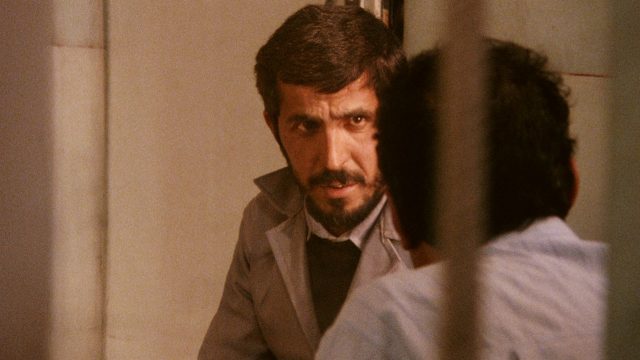
 In his 1996 short
In his 1996 short 